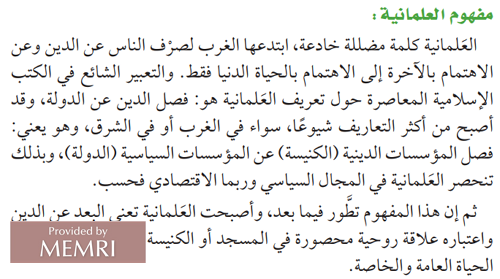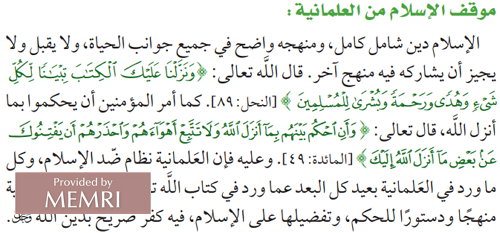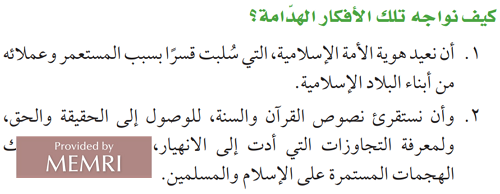Wprowadzenie
Katarski podręcznik do Islamskiej Edukacji dla klasy 11 poświęca cały rozdział sekularyzmowi i niebezpieczeństwom, jakie reprezentuje. Książka opisuje sekularyzm jako negatywne zjawisko, które powstało na Zachodzie i zostało wprowadzone do świata islamskiego przez mocarstwa kolonialne w próbie odsunięcia muzułmanów od ich religii i wychowania pokoleń niezwiązanych z islamem. W rozdziale znajduje się lista negatywnych cech sekularyzmu i jego szkodliwych skutków, oraz podkreślenie, że islam uważa to za herezję. Przedstawiając historyczne przykłady sekularyzacji, podręcznik twierdzi, że Wielka Brytania szerzyła sekularyzm w Turcji przez zakładanie komórek kolaborantów pod przewodem Ataturka, i że rewolucja Wiosny Arabskiej w Tunezji położyła kres dyktatorskiemu, antyislamskiemu reżimowi Habiba Bourguiby. W zakończeniu rozdziału znajduje się stwierdzenie, że w celu rozprawienia się z „niszczycielskimi ideami” sekularyzmu i przeciwstawienia „trwającym atakom na islam” muzułmanie muszą ożywić swoją islamską tożsamość i uważnie studiować Koran i Sunnę.
Niniejszy raport stanowi przegląd rozdziału o sekularyzmie w katarskim podręczniku do Islamskiej Edukacji dla klasy 11.
[Ciąg dalszy opracowania nie jest spolszczony.]
Secularism: A Western Invention Intended To Distance People From Religion
The chapter begins with a general definition of secularism, describing it as „a deceptive and misleading term invented[1]by the West to divert people away from religion and from concern with the world to come and cause them to be preoccupied exclusively with life in this world.” It goes on to say: „Contemporary Islamic books usually define secularism as the separation of religion and state. [This definition] is now one of the most prevalent in both the West and the East, and it refers to separating the religious institutions (the Church) from the political ones (the administration). This limits secularism to the political domain, and perhaps [also] the economic one. But this term has developed and come to mean turning away from religion and regarding it as a spiritual relationship [between an individual and God] that is confined to the mosque or church and bears no connection to life in the public or private spheres” (p. 86).
 „Definition of secularism”
„Definition of secularism”
The Colonialists Spread Secularism In Order To Raise Generations Disconnected From Islam
The chapter explains that secularism arose in the West as a result of people’s disgust with the tyranny of the Church which controlled all spheres of life. Later, secularism „penetrated the Islamic and Arab countries by means of colonialism, which sought to distance the [native] residents of the colonies from their religion and from the mosque in order to raise generations disconnected from religion. Then [the colonialists] formed cells of local collaborators to preach secularism and [advocate] distancing religion from the affairs of [daily] life” (p. 86). Among the factors that contributed to the rise of secularism in the Arab and Muslim world, the chapter lists the colonialist military occupation; student delegations that traveled to the West to study and became Westernized; the activity of Christian missionaries; the (academic) Orientalist movement „which devoted all its time to casting doubt on Islam and its principles”; foreign education institutions in Islamic countries; secularist organizations and political parties, and the media (p. 87).
The Characteristics Of Secularism: Licentiousness, Immorality, Destruction Of The Family
Listing the characteristics of the secularist movement in Muslim countries, the chapter says that it advocates „leading a materialist lifestyle and implementing the principle of utilitarianism”; seeks to corrupt education and turn it into a tool for spreading the secularist ideology; subscribes to the principle that the end justifies the means, namely that goals can be achieved in ways that are forbidden and twisted from a moral and political perspective; spreads licentiousness, chaos and immorality and destroys the family, and „spreads propaganda in favor of liberating women from the bonds of religion and decency” (p. 87). Describing the impact of secularism on the Arab and Muslim world, the chapter states that it has caused Muslims to abandon the shari’a and place their affairs in the hands of human beings (rather than God), far from religion. In the moral and social domains, it has caused the spread of alcoholism, gambling, prostitution, „calls for licentiousness,” and „contempt for the values of purity and modesty.” In the economic domain, secularism has led to the practice of usury, which is forbidden in Islam, while the payment of charity (zakat) was abolished and disconnected from the state apparatuses. In the field of education, colloquial Arabic and English have taken the place of Classical Arabic; secularist educational institutions have spread while religious schools have been closed, and religious studies have lost their prestige in favor of the Western sciences (p. 87-88).
Secularism Is Clear Heresy
Articulating „Islam’s position on secularism,” the chapter asserts that, as a comprehensive religion that regulates all spheres of life, Islam does not accept any other way of life. It states: „Secularism is a system opposed to Islam, and everything it asserts is far removed from what is said in the Quran. Adopting secularism as a way of life and as the state constitution, instead of Islam, constitute clear heresy” (p. 88).
 „Islam’s position on secularism”
„Islam’s position on secularism”
Britain Planted Secularist Cells In Turkey; The Arab Spring Ended The Secularization Of Tunisia
The chapter reviews processes of secularization in several Muslim countries, including Egypt in the period of Muhammad 'Ali Pasha during the first half of the 19th century. Discussing the secularization of Turkey after World War I,[2] it states that the Allies, especially Britain, dictated terms to Turkey before withdrawing their forces, including that it sever its ties with Islam, abolish the caliphate and persecute its supporters, persecute clerics and close down religious schools, replace the Arabic alphabet with the Latin one, adopt a civil constitution instead of the shari’a-based one, and transform the Hagia Sophia mosque in Istanbul into a museum. It also claims that Britain „planted cells of collaborators known as 'secularists,’ led by Mustafa Kamal Ataturk, who played a significant role in abolishing the Islamic caliphate” (p. 88).
As another example of secularization the book presents the regime of Habib Bourguiba, who was president of Tunisia in 1957-1987. Describing him as „one of the most important secular politicians in the Arab world,” the book states that his presidency was characterized by oppression and the persecution of Islam. Bourguiba, it says, „called to free the Tunisian woman from all religious bonds,” criminalized polygamy, instated civil law in Tunisia’s courts, adopted a dictatorial and oppressive constitution, and suppressed all forms of Islamic resistance. According to the book, this continued until the popular revolution of the Arab Spring ended the dictatorship in Tunisia.
The Way To Contend With Secularism And With The Current Attack On Islam Is To Revive The Islamic Identity And Study The Quran And Sunna
The last part of the chapter, titled „How We Can Deal with These Destructive Ideas,” lists the two main lessons that should be drawn: „1. [We must] revive the identity of the Islamic nation, which colonialism and its agents in the Muslim lands forcefully robbed us of; 2. [We must] closely study the Quran and the Sunna in order to discover the truth and identify the deviations [from Islam] that caused the downfall [of the Islamic caliphate], in order to confront the ongoing attacks against Islam and the Muslims (p. 89).
 „How We Can Deal with These Destructive Ideas [of Secularism]”
„How We Can Deal with These Destructive Ideas [of Secularism]”
[1] The verb used in Arabic is ibtada’a, connoting an innovation forbidden by Islam.
[2] The textbook erroneously says „World War II.”








